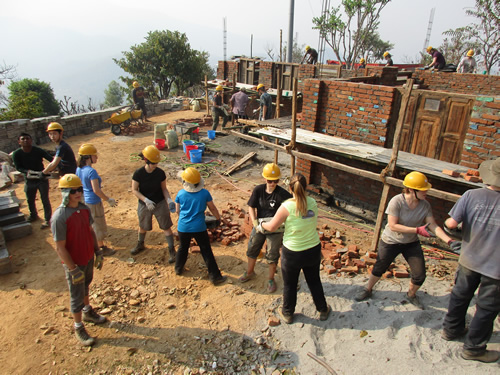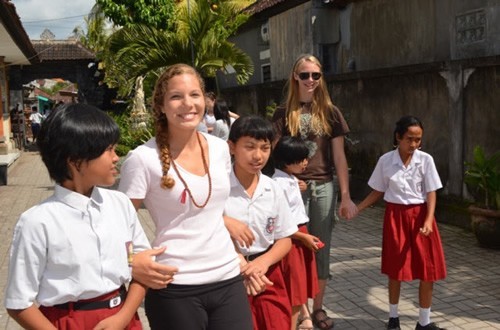Why Your Teen High School Student
Should Go Abroad
The Parents' Guide
By Dr. Jessie Voigts
Wandering Educator Contributing Editor for TransitionsAbroad.com
Resources updated 9/1/2023
What’s the biggest advantage you can give your teens while growing up? The answer might surprise you. It’s the gift of global experience. There are many ways to provide this global experience: travel, summer programs, language classes and programs, volunteer programs, high school study abroad, and exchange programs. Recently, taking a gap year has gained wide acceptance and popularity by some of the top institutions in the country as a way to prepare high school graduates to get the most out of their critical college and university experience. These programs' costs vary significantly, but all result in a massive return on investment from intellectual and emotional development to ultimate career prospects.
Why head abroad through study
abroad, volunteering, language learning, gap
years, exchange,
or internships?
The benefits are numerous, and long-lasting. Take a look…
Developing Your Teen's Global Knowledge
Your teen’s world will expand exponentially with international education. It begins a lifelong journey of global understanding and cultural knowledge. Learning to think in another language (and even dream in another language!) is a core educational experience for global success, as is developing imagination and critical thinking skills from international experience. Travel is the key to global knowledge — and forming connections, friendships, and networks is the key to utilizing that knowledge daily.
"Give it a try. It will change your life in more ways than you can imagine!" said Amanda Weatherford, 18, when asked her advice for other teens considering participating in a youth exchange program. Weatherford spent an academic year as a Rotary Youth Exchange student in Thailand.

|
|
Volunteer service learning while working on a construction project
as a teen. Photo courtesy of GVI.
|
Self Awareness and Development
Your teen will become much more aware of themself and grow in ways that prepare them well for adulthood. Benefits include communication skills, maturity, languages, autonomy, the ability to figure out new situations, independent thinking, networking skills, making friends, and transforming into a global citizen. Research and experiential learning show that the younger we are, the quicker we learn. Every moment is valuable!

|
|
Teen travel, whether when making new friends abroad or in moments of reflection, prepares them for adulthood in every respect.
|
“Having studied abroad a few times
during high school, I can testify that studying in a
different country, living and observing a foreign culture,
and learning a new language allows you to gain self-confidence
and awareness. Whether you are considering spending a
summer, semester, or year overseas, the study abroad
experience provides ample opportunities for you to take
risks, try new things (ranging from food to social situations),
and leave your comfort zone. It is not always easy and
can be downright frustrating, but ultimately the experience
is very rewarding as it eases the transition from adolescence
to adulthood, enabling you to develop communication and
problem-solving skills and to mature both intellectually
and emotionally.” — Connie
Ip.
Career Skills
Learning
a language, ways other cultures work, and flexibility are all critical components in today’s global workforce. Life skills learned while studying, volunteering, or interning abroad transfer well to the workplace. In addition, students can gain financial and business experience by crowd-sourcing or fundraising for their international experience and grant-writing skills by applying
for high school scholarships. Employers want to hire employees capable of flexible thinking, with international work experience, collaboration skills, language skills, and the ability to respond well in different situations. President of George Mason University, Angel Cabrera, notes, “It’s very expensive to study abroad. But it’s also very expensive NOT to study abroad.”
International experience and global competence will make students more employable and enhance everything about their learning and work environments now and in the future — from better grades to more interest in international events and cultures to motivation to work harder, learn more, and travel extensively.
In 2014, the White House took an intense interest in this approach, working together with travel bloggers, digital media influencers, the Institute on International Education, and many others to increase participation in study abroad as a “vital component of their education,” notes Evan
Ryan, former Assistant Secretary of State, Bureau of Educational
and Cultural Affairs, US Department of State as part of a Youtube extract of a Summit on Study Abroad and Global Citizenship.
Penny Pritzker, former secretary of commerce at the US Department of Commerce, said, “In this day and age, more and more employers want to hire people with a true world view.” She encourages students “to travel and to deepen their cultural fluency so they can better compete and succeed in the 21st century.”
Intercultural Competence

|
|
High school service and intercultural experiences in Bali involve exposure that helps breed lifelong tolerance and respect for all cultures and people. Photo courtesy of Global
Leadership Adventures.
|
Intercultural competence is perhaps the culmination of all the above benefits described in terms of why your teen should go abroad. The characteristics and benefits include communication, cultural awareness, acceptance of difference, ethnorelativity (seeing values and behaviors as cultural instead of universal), and being a global citizen. This also includes awareness of difference, the importance of different cultural values, and adaptability to change. Your teen will not only live anywhere but thrive anywhere — able to handle problems large and small with a degree of self-confidence that can only be gained through experience.
“I have witnessed transformations in
them, and subsequently in myself, inspired by the inner
journey, which is the essence of every pilgrimage. I am
now deeply convinced of the value of a personally defined
pilgrimage, undertaken in the tumultuous context of adolescence.
What better time for a pilgrimage
than when everything is being questioned, relationships
are shifting, and one’s place in the world is so difficult
to define? It’s my firm conviction that providing adolescents
with the chance to simply look inward is the greatest
tool we can offer them. Given the opportunity of an emotionally
safe and supportive environment, they will generally
seek challenge, strive to develop meaningful relationships
with others, explore the purpose of their daily lives,
test their own belief systems, and realize the impact
they have on the world around them.” — Jaimie
J. Woodall
First-hand Experience
As Emily Monaco, a travel
writer who studied abroad in high school has noted:
"I
think that the study abroad experience was one of the
most defining of my life. Going at such a young
age was a big part of it. At 14, I didn't know how to
do much of anything for myself, and in France I was expected
to be a lot more independent than I was used to in the
States. It also opened my eyes to a different culture
which, I realize now, isn't all that different from my
culture, considering the places that I could have gone.
But I remember going there thinking I would watch only
French movies and listen only to French music, and I
realized once I got there that not every country was
a little microcosm independent of all other countries,
which was how my experience in the US had been, for the
most part, up to that point.
The biggest skill I developed from
being in France is undoubtedly speaking French. But I
also learned how to cultivate a sense of "universal understanding"
that has helped me learn other foreign languages with
less frustration.”
Perhaps Ben Rhodes, former Deputy National Security Advisor for Strategic Communications and Speech Writing, sums it up best, “Education abroad, their contacts abroad, their knowledge of foreign languages and cultures…that’s going to be an asset they’re going to carry with them their entire lives.”
|
Many meaningful ways exist for a teen high school student (or even a recent graduate) to go abroad.
We offer a directory of excellent programs and independent educational travel options, ranging in price and duration. Many teens may need guidance and supervision on their first trip abroad, especially if they have not traveled with their family or alone. We cover many organized program options and independent travel options. Follow the links below for pages with extensive resources and articles providing options for teen high school students.
Teen
/ High School Exchange Programs Abroad
From exchange programs involving homestays to yearlong study at a high school abroad, there is a wide variety of private and excellent government programs from which to choose involving supervision.
Language Programs Abroad
One of the least expensive ways for a teen to spend time overseas is to learn a language through total immersion, often including a homestay and other supervised activities.
Travel
Programs: Summer Camps and Study Abroad
Summer camps usually involve language learning, adventure, and cultural immersion abroad for memorable experiences. Independent travel is an option for mature teens, especially in safer and more familiar places. The editor-in-chief traveled independently all around Europe starting at age 16 with no incidents and was far richer for the experience.
Volunteer
Service Abroad
The best and most enduring way for teens to learn about people and cultures and what they can do abroad and at home to help others is to participate in a well-run volunteer program.
Gap
Year and Pre-College Programs Abroad
For teens who wish to be inspired and/or well-prepared for college, taking off a gap semester or year to study, volunteer, or travel is often a great option. A gap year or semester is now becoming encouraged by more and more top institutions of higher learning in the country due to the maturity of students with such invaluable intercultural experience.
— Gregory
Hubbs, Editor-in-Chief
|
Dr.
Jessie Voigts is the publisher of Wandering
Educators, a travel library for people curious
about the world. She’s published
six books about travel and intercultural learning,
with more on the way. You can usually find her family
by water — anywhere in the world.
|
